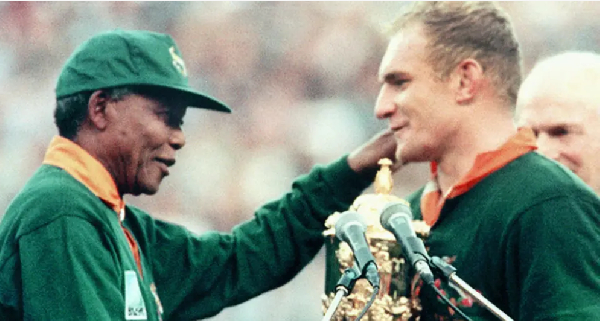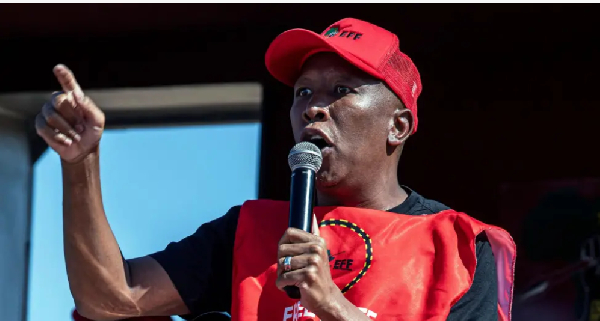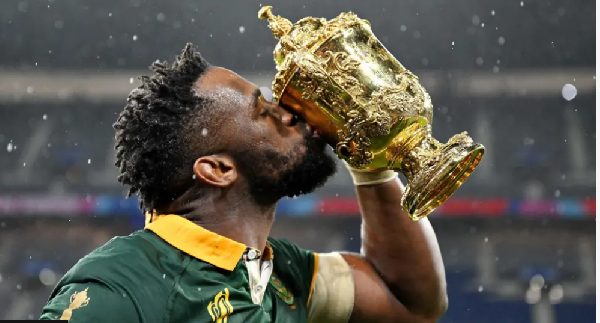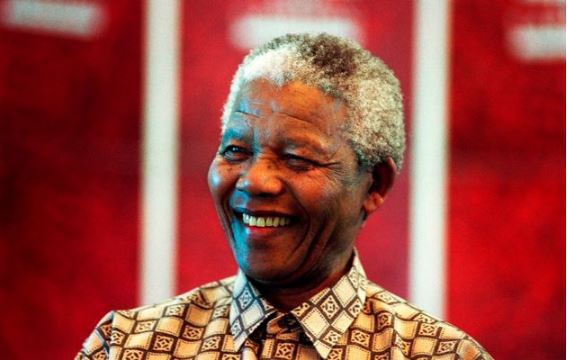Three decades since some ‘Madiba Magic’ inspired South Africa to their seminal win over New Zealand in the 1995 Rugby World Cup final, a Springboks legend has predicted the side are on course for an unprecedented third straight title at the next tournament in Australia.
Standing 6ft 7in tall, Mark Andrews was one of the pillars of that World Cup success on 24 June 1995, but even he would admit it was the towering presence of statesman Nelson Mandela that loomed largest on the day.
“He was worth putting our bodies on the line for because of what he’d done,” said Andrews of the political prisoner turned South African President.
The final, played at Johannesburg’s Ellis Park, around 1,800m above sea level, was going to be about the survival of the fittest in the rarefied Highveld air.
The game was eventually settled in extra time by a drop goal from Springboks fly-half Joel Stransky, as the hosts edged it 15-12.
Years later, when speaking to All Blacks great Ian Jones, who also played in the final, Andrews recounted the theory that the fitter Springboks had outlasted the visitors.
Jones shook his head and told Andrews why he thought South Africa won: “‘You guys had 16 men on the field. You had Nelson Mandela.'”
The Madiba effect
Mandela had spent 27 years in prison but, after his release in 1990, he played a crucial role in ensuring a smooth transition from apartheid to democracy and was elected President in 1994.
His impact on the Springboks during the 1995 Rugby World Cup was immeasurable.
Mandela’s friendship with captain Francois Pienaar would later come to life in the 2009 film Invictus, which starred Morgan Freeman and Matt Damon as President and player respectively.
During the final, Madiba, the clan name by which he was affectionately known, wore the Springboks colours which had long been seen as a vestige of apartheid.
This gesture was a masterstroke as he sought to recast the emblem for all South Africans, sprinkling his charisma, known as ‘Madiba Magic’, on the momentous occasion.
“I think back to what Mandela did, how he united a country by wearing that green Springbok jersey – the jersey of his oppressors – into the stadium,” recalls Sean Fitzpatrick, who captained New Zealand in the final that day.
“I don’t think anyone else could have done what he did in terms of uniting a country.”
South Africa’s success resonated with a new generation of supporters, and on that historic day a young schoolboy by the name of Bryan Habana happened to attend his first ever game of rugby.
“Getting to experience the euphoria of the Springboks overcoming the incredibly talented All Blacks with rugby’s first global superstar in Jonah Lomu, and witnessing Nelson Mandela walk out there in that number six Springbok jersey lit a dream and an inspiration in a 12-year-old boy who’d never played the game of rugby before,” Habana reminisced.
Habana went on to lift the William Webb Ellis trophy in 2007 and, with his 15 tries across all tournaments, the winger sits alongside Lomu as the joint record holders for the most tries scored at Rugby World Cup finals.
“I get to tell everyone 1995 was a watershed moment in my life. For me 2007, winning the World Cup, was by far the pinnacle,” Habana said.
“But I honestly believe that 2019 was our proudest moment as a South African sporting country.”
Up until 2019, Chester Williams (1995), Habana and JP Pietersen (both 2007) were the only players classified as coloured, under South Africa’s apartheid-era racial laws, to feature for the Boks in a final.
Habana believes that the class of 2019 allowed the team to “speak to a community and a population of 60 million South Africans”.
That side, under Siya Kolisi’s captaincy, contained no fewer than six players of colour in the starting line-up and one more on the bench, showing that diversity can bring success.
The Springbok ‘must fall’
However, not everyone shares Habana’s sentiments.
Julius Malema, the leader of South Africa’s far-left opposition party, has described the Springbok emblem as “an apartheid symbol” which “represents white supremacists”.
The Economic Freedom Fighters (EFF) commander-in-chief said “the springbok must fall” and that the national rugby team needs a new jersey, colours and name.
Last week the United Kingdom denied Malema a visa to enter the country, ruling he was “non conducive to the public good” and citing remarks he has made calling for violence against white South Africans.
Andrews believes that Mandela’s vision of unity is what the Springboks stand for, and suggests that politicians like Malema “are trying to marginalise and divide”.
“I don’t think they have what’s best for South Africa at heart,” the 53-year-old former number eight added.
“They have what’s best for them – to try and target and to make people angry and bitter.”
The EFF has been approached for comment.
Bidding for three in a row
The 1995 win set the tone for South African rugby and the country boasts a record four Rugby World Cup wins, including back-to-back triumphs in 2019 and 2023.
Mandela might not be around to be the 16th man, but under coach Rassie Erasmus it is South Africa’s powerful bench, nicknamed the ‘bomb squad’, which gives Andrews confidence that the Boks are on track for a hat-trick of titles in 2027.
“No other nation has two equally strong packs like we have,” he smiled.
“It gives us an unfair advantage because of our depth of talent in those positions. I mean, if we have it, use it.
“If Rassie balances experience and youth – where you have the experience to just guide that ship, and then you have youth that just brings that energy and drive – absolutely, yes, they can [win the title again].”

Nelson Mandela’s decision to wear a green Springboks jersey at the 1995 Rugby World Cup final proved to be a symbolic moment in uniting a deeply divided nation

Left-wing South African politician Julius Malema says the Springboks emblem “represents white supremacists”

Siya Kolisi, the first black man to captain the Springboks, lifted the William Web Ellis trophy in 2019 and 2023
